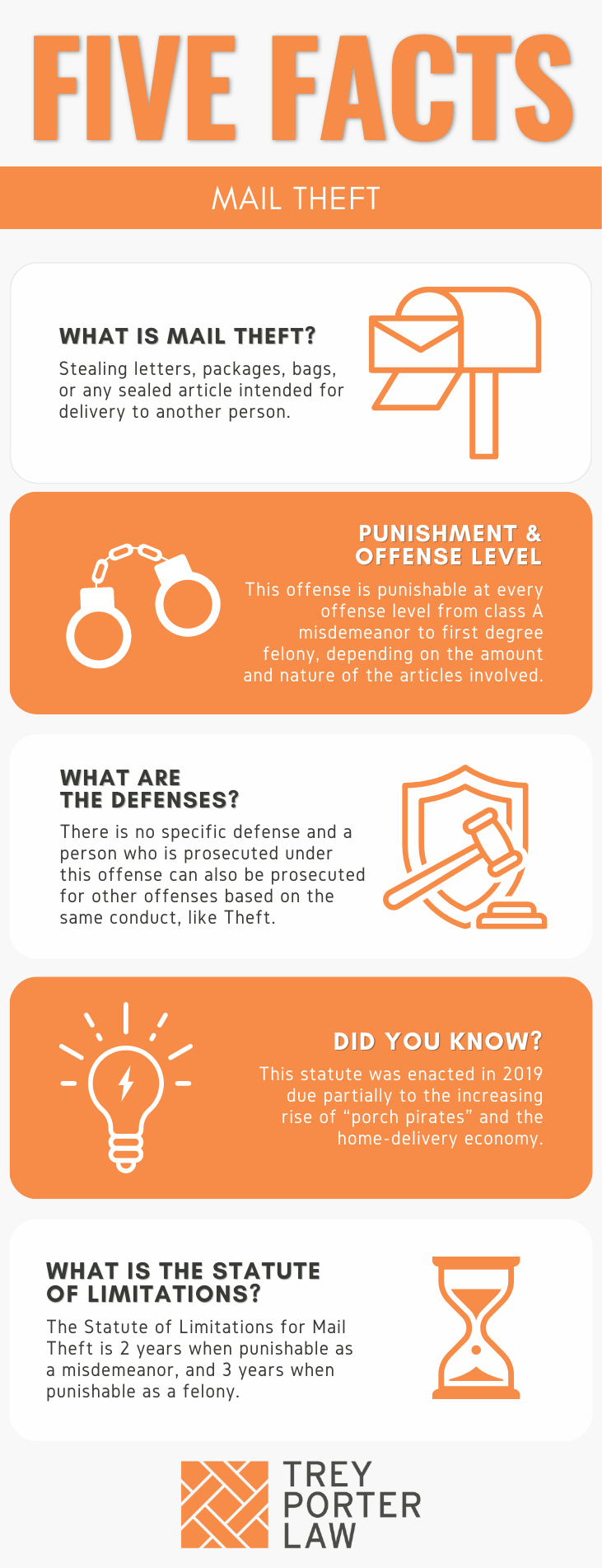WHAT IS MAIL THEFT IN TEXAS?
The Texas law against mail theft prohibits stealing letters, packages, bags, or any other sealed article addressed for delivery to another.

WHAT IS THE MAIL THEFT LAW IN TEXAS?
Tex. Penal Code § 31.20. MAIL THEFT.
(b) A person commits an offense if the person intentionally appropriates mail from another person’s mailbox or premises without the effective consent of the addressee and with the intent to deprive that addressee of the mail.
(c) Except as provided by Subsections (d) and (e), an offense under this section is:
(1) a Class A misdemeanor if the mail is appropriated from fewer than 10 addressees;
(2) a state jail felony if the mail is appropriated from at least 10 but fewer than 30 addressees; or
(3) a felony of the third degree if the mail is appropriated from 30 or more addressees.
(d) If it is shown on the trial of an offense under this section that the appropriated mail contained an item of identifying information and the actor committed the offense with the intent to facilitate an offense under Section 32.51 (Fraudulent Use or Possession of Identifying Information), an offense under this section is:
(1) a state jail felony if the mail is appropriated from fewer than 10 addressees;
(2) a felony of the third degree if the mail is appropriated from at least 10 but fewer than 20 addressees;
(3) a felony of the second degree if the mail is appropriated from at least 20 but fewer than 50 addressees; or
(4) a felony of the first degree if the mail is appropriated from 50 or more addressees.
(e) An offense described for purposes of punishment by Subsection (d)(1), (2), or (3) is increased to the next higher category of offense if it is shown on the trial of the offense that at the time of the offense the actor knew or had reason to believe that an addressee from whom the actor appropriated mail was a disabled individual or an elderly individual.
(f) If conduct that constitutes an offense under this section also constitutes an offense under another law, the actor may be prosecuted under this section, the other law, or both.
WHAT IS THE PENALTY CLASS FOR MAIL THEFT IN TEXAS?
The penalty classification for mail theft depends on the number of addresses from which a person appropriates mail.
- Class A misdemeanor, punishable by up to one year in county jail, if:
- the mail is appropriated from fewer than 10 addresses;
- State jail felony, punishable by 180 days to two years in a state jail facility, if:
- the mail is appropriated from 10 or more but fewer than 30 addresses;
- Third degree felony, punishable by two to ten years in prison, if:
- the mail is appropriated from 30 or more addresses.
WHAT IS THE PUNISHMENT RANGE FOR MAIL THEFT IN TEXAS?
The punishment range for mail theft increases with the number of addresses from which a person appropriates mail.
- Class A misdemeanor, if the appropriated mail is from fewer than ten addresses:
- up to one year in jail, maximum fine of $4,000;
- State jail felony, if the appropriated mail is from ten to 29 addresses:
- 180 days to two years in a state jail facility, maximum fine of $10,000;
- Third degree felony, if the appropriated mail is from 30 or more addresses:
- two to ten years in prison, maximum fine of $10,000.
WHAT ARE THE PENALTIES FOR MAIL THEFT IN TEXAS?
A person charged with mail theft may be eligible for probation after a conviction, or deferred adjudication without a conviction. If the offense is a Class A misdemeanor, the community supervision period may not exceed two years.
The period of community supervision for a state jail felony mail theft is from two to five years, with the possibility of extending supervision for up to ten years.
For a third degree felony mail theft charge, a person may be placed on deferred adjudication for up to ten years, or probation for a period between two and five years.
WHAT ARE THE DEFENSES TO MAIL THEFT IN TEXAS?
The statute does not authorize specific defenses to mail theft. A person accused thereof may attempt to negate one of the elements the State must prove at trial.
WHAT IS THE STATUTE OF LIMITATIONS FOR MAIL THEFT IN TEXAS?
The limitation period for mail theft categorized as a Class A misdemeanor is two years. If the mail theft is a felony, the limitation period is three years.
MAIL THEFT IN TEXAS
The Texas Legislature enacted the law against mail theft in 2019 due to the difficulty of determining the value of mail for ordinary theft charges, the increase in mailbox break-ins, and theft of packages from front porches and other areas of a home’s exterior.
















